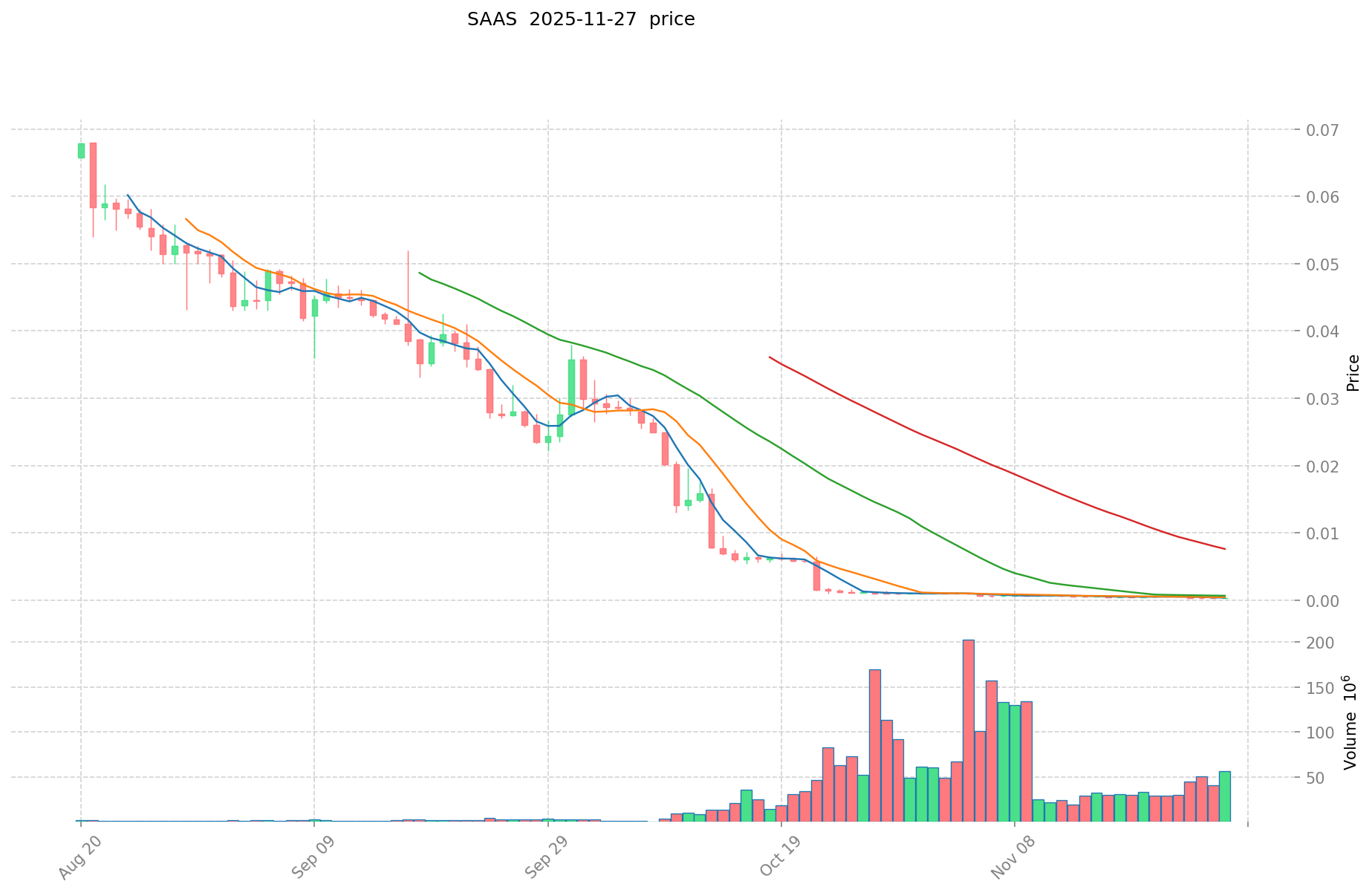What is SAAS: Revolutionizing Business Software Delivery in the Cloud Era
SaaSGo's Positioning and Significance
In 2024, SaaSGo (SAAS) was launched to address the need for code-free deployment of peer-to-peer Dapp marketplaces. As a platform enabling instant creation of DeFi marketplaces, SaaSGo plays a crucial role in the DeFi and decentralized application sectors.
As of 2025, SaaSGo has become an innovative solution in the DeFi ecosystem, offering tools for customizable DeFi marketplaces. This article will analyze its technical architecture, market performance, and future potential.
Origins and Development History
Birth Background
SaaSGo was created in 2024 to solve the challenge of complex DeFi platform development. It emerged during the DeFi boom, aiming to democratize the creation of decentralized marketplaces by providing no-code solutions. SaaSGo's launch brought new possibilities for individuals and organizations to establish their own DeFi ecosystems.
Important Milestones
- 2024: Main network launch, achieving code-free deployment of DeFi marketplaces.
- 2025: Ecosystem expansion, with the number of customized DeFi platforms growing.
Supported by its community, SaaSGo continues to optimize its technology, security, and real-world applications.
How Does SaaSGo Work?
Decentralized Control
SaaSGo operates on a decentralized network of computers (nodes) worldwide, free from control by traditional financial institutions. These nodes collaborate to validate transactions, ensuring system transparency and attack resistance, empowering users with greater autonomy and enhancing network resilience.
Blockchain Core
SaaSGo's blockchain is a public, immutable digital ledger recording every transaction. Transactions are grouped into blocks and linked through cryptographic hashes, forming a secure chain. Anyone can view the records, establishing trust without intermediaries.
Ensuring Fairness
SaaSGo uses a consensus mechanism to validate transactions and prevent fraudulent activities like double-spending. Participants maintain network security through activities such as staking or running nodes, receiving SAAS tokens as rewards.
Secure Transactions
SaaSGo employs public-private key encryption to protect transactions:
- Private keys (like secret passwords) are used to sign transactions
- Public keys (like account numbers) are used to verify ownership
This mechanism ensures fund security, while transactions remain pseudonymous.
SAAS Market Performance
Circulation Overview
As of November 28, 2025, SAAS has a circulating supply of 800,000,000 tokens, with a total supply of 1,000,000,000.
Price Fluctuations
SAAS reached its all-time high of $0.1182 on December 20, 2024. Its lowest price was $0.00027, occurring on November 24, 2025. These fluctuations reflect market sentiment, adoption trends, and external factors.
Click to view the current SAAS market price

On-Chain Metrics
- Daily Trading Volume: $17,244.95 (indicates network activity)
- Active Addresses: 27 (reflects user engagement)
SaaSGo Ecosystem Applications and Partnerships
Core Use Cases
SaaSGo's ecosystem supports various applications:
- DeFi: SaaSGo DeFi Dex Builder, enabling users to create customized DeFi marketplaces.
- No-Code Development: Facilitating the deployment of peer-to-peer Dapp marketplaces without coding.
Strategic Collaborations
SaaSGo has not disclosed specific strategic partnerships. However, its platform empowers individuals and organizations to build their own DeFi ecosystems, potentially fostering collaborations within its user base.
Controversies and Challenges
SaaSGo faces the following challenges:
- Market Adoption: As a relatively new and niche platform, gaining widespread adoption may be challenging.
- Regulatory Risks: The evolving regulatory landscape for DeFi and no-code platforms could pose potential risks.
- Competitive Pressure: Competition from established DeFi platforms and other no-code solutions in the blockchain space.
These issues may influence community discussions and drive SaaSGo's ongoing development efforts.
SaaSGo Community and Social Media Atmosphere
Fan Enthusiasm
SaaSGo's community engagement metrics are not publicly available. However, as a platform enabling users to create their own DeFi marketplaces, it has the potential to foster diverse sub-communities.
Social Media Sentiment
Due to limited public information, a comprehensive analysis of social media sentiment for SaaSGo is not possible at this time.
Hot Topics
Without access to current social media trends, it's challenging to identify specific hot topics related to SaaSGo.
More Information Sources for SaaSGo
- Official Website: Visit SaaSGo's official website for features, use cases, and latest updates.
- White Paper: SaaSGo White Paper details its technical architecture, goals, and vision.
- X Updates: SaaSGo uses @SaaSGoOfficial on X platform. Follower count and engagement metrics are not available.
SaaSGo Future Roadmap
Specific future plans for SaaSGo are not publicly outlined. However, given its focus on no-code DeFi platform creation, potential goals might include:
- Expanding the range of customizable features for DeFi marketplaces
- Enhancing user experience and accessibility for non-technical users
- Integrating with more blockchain networks to increase platform versatility
How to Participate in SaaSGo?
- Purchase Channels: SAAS tokens can be acquired on Gate.com.
- Storage Solutions: Use ERC-20 compatible wallets for secure storage.
- Ecosystem Participation: Explore the SaaSGo platform to create and manage DeFi marketplaces.
- Community Engagement: Follow SaaSGo's official channels for updates and potential community initiatives.
Summary
SaaSGo is redefining the DeFi landscape by enabling code-free deployment of customizable Dapp marketplaces. It offers benefits such as accessibility to non-technical users and the ability to tailor DeFi platforms to specific community needs. While facing challenges like market adoption and potential regulatory scrutiny, SaaSGo's innovative approach to democratizing DeFi development positions it uniquely in the decentralized technology space. Whether you're a DeFi enthusiast or a community leader looking to create a tailored financial ecosystem, SaaSGo presents an interesting platform to explore and engage with.
FAQ
What is SaaS in simple terms?
SaaS stands for Software as a Service. It's a way to deliver software over the internet, where users access applications via a web browser instead of installing them on their computers.
Is Netflix is SaaS?
Yes, Netflix is a SaaS (Software as a Service) company. It provides streaming content to subscribers over the internet, fitting the SaaS model of delivering software and services online.
Is Zoom a SaaS?
Yes, Zoom is a SaaS (Software as a Service) platform. It provides video conferencing and communication services through cloud-based software, accessible via subscription.
Is Amazon a SaaS company?
No, Amazon is not primarily a SaaS company. While it offers some SaaS products like AWS, its main business is e-commerce and cloud computing services.
Share
Content